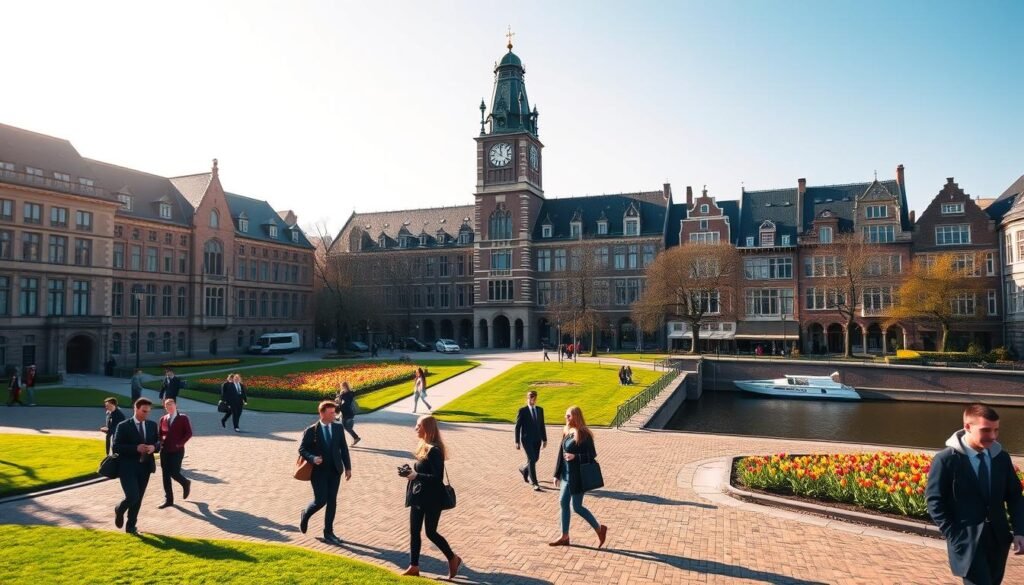Did you know that over 112,000 international students choose the Netherlands as their study destination? This small yet vibrant country has become a top choice for learners worldwide. But what makes it so appealing?
First, let’s clear up a common confusion. While many people refer to the country as Holland, it’s officially called the Netherlands. Holland actually refers to two of its provinces: North and South Holland, home to major cities like Amsterdam, Rotterdam, and The Hague.
The Netherlands offers a unique blend of high-quality education and practical opportunities. With English-taught programs at research universities and applied sciences institutions, it’s no wonder 16% of the student population comes from abroad.
Beyond academics, the country provides work opportunities during and after studies. The orientation year is a standout feature, allowing graduates to stay and explore job prospects. Ready to learn more about tuition fees, the job market, and post-study opportunities? Let’s dive in!
Key Takeaways
- The Netherlands is a top European destination for international students.
- Holland refers to two provinces, while the Netherlands is the official name.
- English-taught programs are widely available at universities.
- Students can work during and after their studies.
- The orientation year helps graduates transition into the job market.
Why Study in the Netherlands?
With 12 universities ranked globally, the Netherlands stands out as a hub for academic excellence. This small European country offers a unique blend of high-quality education and a welcoming environment for learners from all over the world.
World-Class Universities
The Netherlands is home to some of the top universities in the world. Institutions like TU Delft and the University of Amsterdam consistently rank within the global top 100. These universities are known for their cutting-edge research and innovative teaching methods.
English-Taught Programs
One of the biggest advantages is the availability of over 2,100 English-taught programs. Whether you’re pursuing a bachelor’s or master’s degree, you’ll find a wide range of options tailored to your interests. This makes it easier for international students to adapt and succeed.
International Environment
With students from over 190 nationalities, the Netherlands offers a truly multicultural experience. Around 16% of the student population comes from abroad, creating a diverse and inclusive classroom setting. Programs like CIEE further enhance this by integrating study abroad opportunities with local universities.
Additionally, the country boasts 70 higher education institutions, offering both practice-oriented and research-based degrees. This variety ensures that every student finds a program that fits their career goals.
Understanding the Dutch Education System
The Dutch education system is known for its unique structure and flexibility. It offers two main types of higher education institutions: research universities and universities of applied sciences. Each caters to different academic and career goals, providing students with diverse pathways to success.

Research Universities vs. Universities of Applied Sciences
Research universities focus on theoretical knowledge and academic research. Programs here, like those at Leiden University, typically last three years for a bachelor’s degree. These institutions are ideal for students aiming for careers in academia or research-intensive fields.
On the other hand, universities of applied sciences emphasize practical skills and industry connections. For example, Rotterdam UAS offers four-year degrees that include mandatory internships. This hands-on approach prepares students for direct entry into the workforce.
Bachelor’s and Master’s Programs
Bachelor’s programs at research universities are shorter than in the U.S., typically lasting three years. In contrast, applied sciences programs often include a placement year, giving students real-world experience. Master’s degrees build on this foundation, offering specialized knowledge in various fields.
Interdisciplinary options, like the PPLE program at the University of Amsterdam, combine subjects like Politics, Psychology, Law, and Economics. Dual degrees, such as the partnership between the University of Groningen and Ca’ Foscari Venice, provide global perspectives and expanded career opportunities.
Whether you prefer a research-focused or practice-oriented path, the Dutch education system offers programs tailored to your goals. This flexibility makes it a popular choice for students worldwide.
Tuition Fees and Living Costs
Planning your education abroad involves understanding both tuition fees and living costs. These factors vary depending on your nationality, chosen program, and city of residence. Let’s break down the essentials to help you budget effectively.
Tuition Fees for EU and Non-EU Students
For EU students, average tuition fees are around €2,600 per year. Non-EU students, however, face higher costs. Bachelor’s programs range from €6,000 to €15,000 annually, while master’s programs can cost between €13,000 and €20,000.
Technical programs and specialized schools often have higher fees compared to general programs. For example, University College Maastricht charges differently based on the field of study. Scholarships, like those offered by Nuffic, can help offset these expenses for non-EEA students.
Cost of Living in the Netherlands
The cost of living varies across cities. In Amsterdam, rent can range from €800 to €1,200 per month, while in Rotterdam, it’s typically €500 to €800. Student dorms are often more affordable than private rentals.
Monthly expenses include food (€200-300) and transport (€35-100 for an OV-chipkaart). Part-time work, limited to 16 hours per week, can help manage these costs. With careful planning, you can enjoy a comfortable lifestyle while pursuing your academic goals.
Work Rules for International Students
International students in the Netherlands have access to flexible work opportunities during their academic journey. Balancing a job with study can provide valuable experience and help cover living costs. However, there are specific rules and permits to follow.
Working While Studying
Students can work up to 16 hours per week during academic terms. This allows them to focus on their programs while gaining practical skills. During the summer months (June to August), full-time work is permitted, offering more opportunities to earn and learn.
Popular sectors for student employment include hospitality, IT, and tutoring. For example, H&M in Amsterdam often hires students for part-time roles, while TU Delft offers research assistant positions. These roles not only provide income but also enhance resumes.
Work Permits and Restrictions
Non-EU students need a TWV permit, sponsored by their employer, to work legally. The IND (Immigration and Naturalization Service) oversees this process, ensuring compliance with regulations. Violating work hour limits can lead to penalties, including visa revocation.
Tax implications are another consideration. Skilled migrants may benefit from the 30% ruling, which reduces taxable income. This incentive makes the country even more attractive for students planning to stay after graduation.
By understanding these rules, students can make the most of their time in this vibrant country. Whether working part-time or full-time, the experience gained can be a stepping stone to future career success.
The Orientation Year for Graduates
Graduating from a Dutch institution opens doors to a unique post-study opportunity. The orientation year allows graduates to stay in the country for up to three years to explore job prospects. This program is designed to help students transition smoothly into the workforce.
What is the Orientation Year?
The orientation year is a post-graduation residence permit. It enables graduates to search for jobs without an income requirement during this period. Eligible degrees include Dutch-accredited bachelor’s, master’s, and PhD programs.
Applications are processed through the IND immigration service. This streamlined process ensures graduates can focus on their career search. Companies like ASML and Philips actively recruit participants, offering opportunities in high-demand fields.
Benefits of the Orientation Year
One of the key advantages is the chance to secure permanent employment. Around 60% of participants find long-term job roles within the three-year period. This program also supports entrepreneurship through the Startup Visa scheme.
Success rates vary across fields, with engineering graduates often finding roles faster than those in humanities. This flexibility makes the orientation year a valuable resource for all graduates.
Job Opportunities After Graduation
The Netherlands is a hub for career growth, offering diverse job opportunities for graduates. With its 18th largest global economy and over 50 Fortune 500 companies, the country provides a thriving environment for professionals. Around 80% of international graduates find work within one year, making it an attractive destination for career development.

Job Market in the Netherlands
The Dutch job market is known for its innovation and global reach. Key industries like agri-food and tech dominate, with institutions like Wageningen UR and Eindhoven Brainport leading the way. In-demand roles include data scientists and renewable energy engineers, reflecting the country’s focus on sustainability and technology.
Graduates from universities like TU Delft and the University of Amsterdam are highly sought after. These institutions emphasize research and practical skills, preparing students for successful careers. The EURES job mobility portal also supports EU job seekers, making it easier to explore opportunities across borders.
Networking and Career Support
Networking plays a crucial role in securing opportunities. Universities offer robust career services, such as VU Amsterdam’s Industry Nights, which connect students with potential employers. The Holland Alumni Network further enhances professional connections, helping graduates build long-term careers.
Understanding cultural norms is also important. Dutch workplaces value direct communication and collaboration. This openness fosters a supportive environment for international students transitioning into the workforce.
With the right skills and connections, graduates can thrive in this dynamic job market. Whether in tech, agri-food, or renewable energy, the Netherlands offers endless possibilities for career growth.
Living in the Netherlands
Living in this vibrant country offers a mix of modern convenience and rich history. For students, it’s an opportunity to experience a unique lifestyle while pursuing their education. From finding the right accommodation to navigating the efficient transport system, this section covers everything you need to know.
Accommodation Options
Finding a place to live can be challenging, especially in popular cities like Amsterdam and Utrecht. Many students rely on platforms like Stadswonen Rotterdam and SSH Short Stay to secure housing. These platforms offer affordable options tailored to student needs.
Be cautious of rental scams targeting international students. Always verify listings and avoid paying deposits without seeing the property. Shared apartments and student dorms are common choices, providing both affordability and a social environment.
Transportation and Travel
Bicycles are the primary mode of transport for 88% of students. You can buy a used bike for €100-300 or rent one for €15/month through services like Swapfiets. Cycling is not only eco-friendly but also a great way to explore the cities.
The NS rail network connects all major cities in under two hours, making weekend trips easy. Popular destinations include Brussels (2 hours by train) and Berlin (6 hours by FlixBus). Traveling is a fantastic way to enrich your study abroad experience.
Don’t miss cultural events like King’s Day or visits to the Rijksmuseum. These activities offer a deeper understanding of the country’s heritage and traditions.
Conclusion
Choosing the Netherlands for your academic journey offers unparalleled benefits. With English-taught programs widely available, adapting to higher education here is seamless. The orientation year provides graduates with valuable time to explore job opportunities, making it a standout feature.
For housing, apply early through platforms like DUWO to secure your spot. Non-EU graduates can enjoy a 90-day visa-free period to search for jobs, adding flexibility to their career plans. Learning basic Dutch phrases can also ease workplace integration and enhance your experience.
Ready to take the next step? Explore the programs database on Study in Holland and start planning your future today. The Netherlands is not just a place to study—it’s a place to grow and thrive.
FAQ
What are the benefits of studying in the Netherlands?
The country offers world-class universities, English-taught programs, and a diverse international environment, making it an attractive destination for students worldwide.
How does the Dutch education system work?
It includes research universities and universities of applied sciences, offering bachelor’s and master’s programs tailored to different academic and professional goals.
What are the tuition fees and living costs in the Netherlands?
Fees vary for EU and non-EU students, and living expenses depend on the city. Budgeting is essential to manage costs effectively.
Can international students work while studying?
Yes, students can work part-time, but they need a work permit and must adhere to specific restrictions.
What is the Orientation Year for graduates?
It’s a one-year visa allowing graduates to stay in the Netherlands to seek employment or start a business, providing valuable opportunities to transition into the job market.
What job opportunities are available after graduation?
The Netherlands has a strong job market, especially in sectors like technology, engineering, and business. Networking and career support services can help graduates find suitable roles.
What are the accommodation options for students?
Options include student housing, shared apartments, and private rentals. It’s advisable to start searching early due to high demand.
How is transportation in the Netherlands?
The country has an efficient public transport system, including trains, buses, and bicycles, making it easy to travel between cities and campuses.





